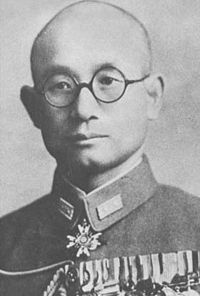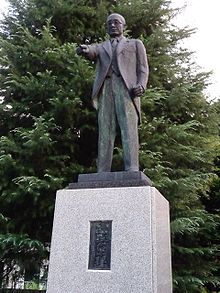- Masanobu Tsuji
-
Masanobu Tsuji 
Nickname The Wolf, The God of Operations Born October 11, 1902
Ishikawa Prefecture, JapanDied 1961? Allegiance Empire of Japan Service/branch  Imperial Japanese Army (IJA)
Imperial Japanese Army (IJA)Years of service 1924–1945 Rank Rikugun Taisa (Colonel) Battles/wars World War II (Pacific War) Memorial statue of Masanobu Tsuji in Kaga, Ishikawa In this Japanese name, the family name is "Tsuji".
In this Japanese name, the family name is "Tsuji".Masanobu Tsuji (辻 政信 Tsuji Masanobu, 11 October 1901? – 1961?[1]) was a tactician of the Imperial Japanese Army during the Second World War and later a politician. While he was never indicted for war crimes after World War II, subsequent investigations have revealed that he was involved in war crimes throughout the Pacific war including the massacre of Chinese civilians in Singapore, the executions of numerous surrendered prisoners of war during the Bataan Death March, and other war crimes in China.
Contents
Biography
Masunobu Tsuji was born in the Ishikawa Prefecture in Japan. He received his secondary education at a military academy and then graduated from the War College.
Tsuji served as a staff officer in the Kwantung Army in 1937-1939. His aggressive and insubordinate attitude contributed to the Soviet-Japanese Border Wars, particularly the Changkufeng Incident/Battle of Lake Khasan and the Nomonhan Incident/Battle of Khalkhin Gol.[2]
During the Pacific war he served mainly in Malaya, Burma, the Philippines, and Guadalcanal.[3] He served as a staff officer under General Tomoyuki Yamashita.[4] At Guadalcanal, Tsuji planned and led the last two attempted assaults by the Japanese forces to expel the Americans from the island. Tsuji personally returned to Tokyo after these failures to urge the evacuation of the troops from Guadalcanal. He impressed the Emperor with his frankness.
In Retribution: The Battle for Japan, 1944-45, Max Hastings wrote, "Col Masanobu Tsuji [was] a fanatic repeatedly wounded in action and repeatedly transferred by generals exasperated by his insubordination. Tsuji once burned down a geisha house to highlight his disgust at the moral frailty of the officers inside it. His excesses were responsible for some of the worst Japanese blunders on Guadalcanal. He was directly responsible for brutalities to prisoners and civilians in every part of the Japanese empire in which he served. In northern Burma, he dined on the liver of a dead Allied pilot, castigating as cowards those who refused to share his meal: 'The more we eat, the brighter will burn the fire of our hatred for the enemy.'"[5]
After Japan's surrender in September 1945, Tsuji went into hiding in Thailand for fear of being tried on war crimes charges. When it was clear he would not be, he returned to Japan and wrote of his years in hiding in Senko Sanzenri (潜行三千里, lit. Lurking 3000 li), which became a best seller. His memoirs made him famous and he later became a member of the Diet. In April 1961, he traveled to Laos and was never heard from again. Presumably a casualty of the Laotian Civil War, he was declared dead on July 20, 1968.[6]
Honors
- Order of the Rising Sun, Gold Rays with Rosette.[7]
- Order of the Sacred Treasure, 3rd Class.[7]
- Order of the Golden Kite, 4th Class and 5th Class.[7]
- Decoration of Manchuria, 4th Class and 5th Class.[7]
- Commemoration Medal of the Coronation of Emperor Showa.[7]
- Commemoration Medal of the Census.[7]
- Commemoration Medal of the Founding of Manchuria.[7]
- Commemoration Medal of the 2,600th Year after the Accession of Emperor Jimmu.[7]
- Campaign Medal of the Chinese Incident.[7]
- Campaign Medal of the Manchurian Incident.[7]
Notes
- ^ Tsuji's birthyear is disputed. Several Japanese sources use 1903, but Tsuji himself wrote it was 1901. Other sources say 1900 or 1902. The 1901 date is from David Bergamini's Japan's Imperial Conspiracy, p. 981.
- ^ Coox, Alvin D.: Nomonhan: Japan Against Russia, 1939, ISBN 0-8047-1835-0
- ^ http://www.warbirdforum.com/tsuji.htm
- ^ Bergamini, p. 981.
- ^ Hastings, Max, Retribution, the Battle for Japan, 1944-45, Alfred A Knopf, New York, 2008, p. 53.
- ^ http://search.japantimes.co.jp/cgi-bin/nn20000726b1.html
- ^ a b c d e f g h i j Tsuji, Masanobu. (1997). Japan's Greatest Victory, Britain's Worst Defeat, p. 108.
References
- Peterson, James W., Barry C. Weaver and Michael A. Quigley. (2001). Orders and Medals of Japan and Associated States. San Ramon, California: Orders and Medals Society of America. ISBN 1-8909-7409-9
- Tsuji, Masanobu. (1997). Japan's Greatest Victory, Britain's Worst Defeat (Margaret E. Lake, tr.). New York: Da Capo Press. 10-ISBN 1-873-37675-8; 13-ISBN 978-1-873-37675-1 (cloth)
External links
Categories:- Japanese military personnel of World War II
- People from Ishikawa Prefecture
- 1901 births
- 1960s deaths
- Japanese military leaders
- Recipients of the Order of the Rising Sun
- Recipients of the Order of the Sacred Treasure
- Missing people
- Japanese war crimes
Wikimedia Foundation. 2010.

